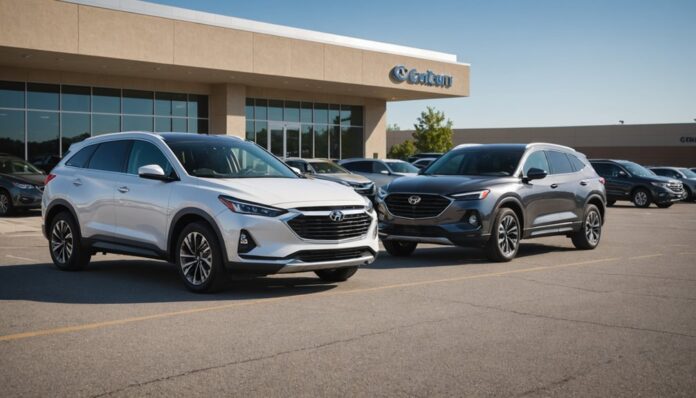Sedans and crossovers cater to different lifestyles, making the choice between them essential. Sedans excel in on-road performance and affordability, while crossovers offer spacious interiors and versatile cargo options. For those who prioritize agility and fuel efficiency, sedans are the better choice. However, families and exploration enthusiasts may prefer the safety features and off-road capability of crossovers. Which vehicle type aligns with your daily activities, budget, and preferences?
Highlights
- Sedans prioritize on-road performance and fuel efficiency, making them ideal for city dwellers and frequent highway drivers.
- Crossovers offer more cargo space, versatility, and off-road capability, suiting families and outdoor enthusiasts.
- Sedans are often more affordable with lower purchase prices and better fuel efficiency, leading to long-term cost savings.
- Crossovers typically feature advanced safety features and higher ground clearance, excelling in rollover tests and providing improved responsiveness.
- Ultimately, the choice between sedans and crossovers depends on individual priorities, budget considerations, and lifestyle needs.
What Are the Key Differences Between Sedans and Crossovers?
While both sedans and crossovers are popular options for car buyers, they exhibit distinct differences in design and functionality.
One of the most noticeable differences lies in their design aesthetics. Sedans typically feature a more streamlined and lower-to-the-ground profile, while crossovers have a higher stance and more rugged lines. These design differences reflect their intended uses: sedans prioritize on-road performance, while crossovers aim to balance on-road comfort with off-road capability.
Interior comfort also varies between the two. Sedans usually offer a more compact, intimate cabin, while crossovers provide more spacious interiors and cargo areas.
Ultimately, the choice between a sedan and a crossover depends on an individual’s lifestyle and priorities, with each type catering to distinct needs and preferences.
Evaluating Fuel Efficiency: Sedans Vs Crossovers
Fuel efficiency is a key consideration for many car buyers, and sedans and crossovers exhibit distinct differences in this regard.
Generally, sedans tend to have better fuel economy due to their lighter weight and more aerodynamic design. On the other hand, crossovers, which combine elements of SUVs and cars, often have a heavier build and a higher ground clearance, which can negatively impact their fuel efficiency.
However, many modern crossovers offer advanced hybrid options that can considerably improve their fuel economy. These hybrid options often make crossovers more appealing to environmentally-conscious consumers.
Ultimately, buyers should carefully evaluate the fuel efficiency of both sedans and crossovers to choose the option that best fits their needs and lifestyle.
Cargo Space Considerations: Which Offers More Room?
Typically, a key difference between sedans and crossovers is the amount of cargo space they provide.
Crossovers generally offer more cargo room, with some models featuring fold-down seats to expand storage capacity. Sedans, while often more compact, can still provide adequate cargo space for smaller items.
Cargo configurations, such as 60/40 split-fold seats, can be found in many crossovers, allowing for customization of storage space. Additionally, some crossovers offer innovative storage solutions, like cargo nets and organizers, to help keep belongings secure and within reach.
In contrast, sedans often have fixed storage compartments, limiting flexibility. For those who prioritize cargo space, a crossover may be the more practical choice. However, for city dwellers, a sedan’s compact size may be more desirable.
Comparing Price Points: Sedans Vs Crossovers
Beyond cargo space considerations, another significant factor regarding the sedan versus crossover debate is the price point of each vehicle type.
Sedans are often associated with affordability, offering lower purchase prices and better fuel efficiency, resulting in long-term cost savings. The Honda Civic and Toyota Corolla are examples of sedans that provide excellent value for their price.
On the other hand, crossovers, such as the Honda CR-V and Subaru Forester, may offer more value in relation to versatility and features, but often come with a higher price tag.
However, some crossovers may offer better resale value, which can offset the initial higher cost.
Ultimately, the choice between a sedan and a crossover depends on individual priorities and budget considerations.
Safety Features: How Do Sedans and Crossovers Measure Up?
How do sedans and crossovers compare regarding safety features? Both types of vehicles have made considerable progress in incorporating advanced safety features, making them more appealing to families and safety-conscious drivers.
Sedans and crossovers often come equipped with active safety features such as lane departure warning, blind spot detection, and forward collision warning.
With respect to crash ratings, sedans tend to perform well in frontal and side impact tests, while crossovers excel in rollover tests due to their higher ground clearance.
However, both types of vehicles can earn top safety ratings from reputable organizations like the National Highway Traffic Safety Administration and the Insurance Institute for Highway Safety.
Ultimately, the choice between a sedan and a crossover depends on individual priorities and lifestyle needs.
On-Road Performance: Handling and Responsiveness Compared
While safety features are an essential factor for many drivers, another key aspect to contemplate is how sedans and crossovers perform on the road.
On-road performance greatly impacts the driving experience, and understanding the differences between sedans and crossovers in this regard can inform purchasing decisions.
Handling characteristics are distinct between the two vehicle types, with sedans generally offering superior agility and cornering due to their lower center of gravity.
Crossovers, while often taller and heavier, can provide improved responsiveness metrics during sudden maneuvers, attributed to advancements in electronic stability control systems.
Recognizing these differences in on-road performance will aid drivers in identifying which vehicle type best suits their driving preferences.
Assessing Lifestyle Needs: Which Vehicle Type Suits You Best?
What role does lifestyle play in determining whether a sedan or crossover is the most suitable vehicle choice? Evaluating lifestyle needs is essential to making an informed decision.
A person’s daily commuting habits, family size, and recreational activities all contribute to their lifestyle priorities. Sedans are ideal for city dwellers or those with shorter commutes, offering better fuel efficiency and maneuverability in tight spaces.
Crossovers, on the other hand, cater to those with active lifestyles, providing ample cargo space and versatility for road trips or outdoor excursions.
Understanding one’s lifestyle priorities allows them to choose a vehicle that seamlessly integrates into their daily routine, ensuring a harmonious balance between form, function, and practicality.
Conclusion
Choosing between a sedan and a crossover ultimately depends on individual lifestyle needs. Sedans offer better fuel efficiency and on-road performance, making them ideal for those prioritizing affordability and agility. Crossovers, with their spacious interiors and enhanced safety features, suit families and thrill-seekers. By evaluating key differences, individuals can make an informed decision that aligns with their daily activities, budget, and personal preferences, ensuring a harmonious match between vehicle and lifestyle.


